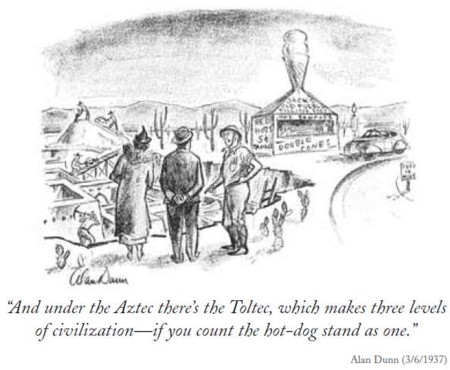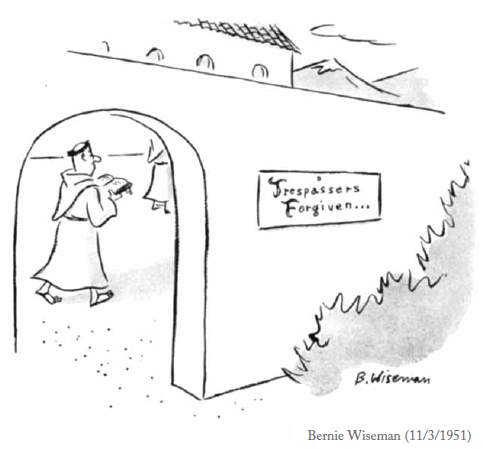The Past
I said there was but one solitary thing about the past worth remembering and that was the fact that it is past; can't be restored...
For the majority of us, the past is a regret, the future an experiment.[95]
We may or may not be able to change 'here and now' or the future but we certainly can't change the past that has led to 'here and now'.
I don't have to go back far in history to realise that if all the evil, and good, things in history had not happened I would not be here, nor would you or anyone else here today.
If Hitler had been killed in the First World War (it must have been close on several occasions) then the world as we know it would not exist. Maybe something like it might but it could not be the same. I would not have been born; and would not exist to think about these things; and nor would you.
I can condemn the idea of anybody repeating his actions. But suppose I wished he had not existed, and done those evil things, and my wish was granted. Then I wouldn't be here to make that wish. So my wish is either dishonest (I know it will have no effect and am simply engaging in moral hubris) or impossible (because if granted I would not be here to wish it).
Hitler, in turn, was no doubt the direct outcome of the actions of some Saint. The same logic applies to most things in the past. They are essential to and bound to the present. They are part of this existence. So things and particularly people in the past, and many in the present, are essential for my being. Almost everything in the universe is essential to your being.
We can have no regrets about the past that are not also dissatisfactions about the present. If you want to be content in life you must learn not to regret the past.
When we look at the past we can see that on our time line all the people in the world and all things in the universe worked together to get to where we are now. We can see lots of what seem to be chance events and the personal choices that went into that outcome.
Once in a while, I'm standing here, doing something. And I think, "What in the world am I doing here?" It's a big surprise.[96]
A myriad of events went into the fact of your being and you're reading this. Some events, immediately preceding the lovemaking that led to you, were so contemporary or were so remote that they had no impact whatsoever on the exact timing of the act and the exact conditions of both parents physiology that determined which sperm got there first and if the zygote survived. So a person scalding their hand in Dubbo; a baby crying in India; even some major event that was, as yet, unknown was not essential to you. But those events might well have led to the existence of someone in your life or World history since.
The impact of events becomes more real as you trace the relationships with other events back in time. Until even things that happened in distant parts of the globe including natural events in the Universe (that changed the weather or the apparently random mutations of life) are essential to your individual existence. And most of the 'big events' of history had to happen just as they did or you would not be reading this.

When you hear that, the Tsar of Russia (and all his daughters) were executed by Bolsheviks or that six million Jews were murdered by Nazis you should be shocked (about the latter anyway) and hope it won't happen again, but recognise that you would not be here to hold that view (or any other) unless it had happened just as it did. Thus you should treat most of history prior to your birth as essential (neither good nor bad). Apart from establishing your dubious rights to property or status, events prior to your birth are useful only if you are using them to understand the Universe or as an object lesson for the future.
There are some certainties here: we can do nothing about the past once it is past.
This reason alone is sufficient reason not to bring children up with the belief that Protestants or Catholics or Serbs or Croatians or black men or white men ruined their past or stole their land. Such beliefs can demonstrably ruin a person's life by tying it to the past.
A recent study of successful, happy and still alive people over 80 found that taking the best from the past is an important life skill. These people were able to be able to distil the positive from their life experiences and to leave the negative behind.
Sometimes others will do us evil. They will do this because of something in their past. They may do it because they envy us or hate something about us (our skin colour our race our religion); because it suits some other purpose (maybe their desire to advance themselves); because they are a criminal or mentally ill; because they are a pawn in someone else's schemes; because they are a victim of some philosophy that has them do this on principle; because it is the rule or law; because it is their job; by accident or mistaken identity; or because they are taking revenge for some real or imagined deed of ours.
Our culture tells us 'to forgive those who have trespassed against us'. The author of Mathew tells us that Jesus belaboured this point in his Sermon on the Mount and he reiterates it in the Lord's Prayer. This is good advice. It means that you should not hate others or bear animosity (that interferes with your own mental state). There is no point; 'what's done is done'; and animosity is bad for your health.
Trespasses come in lots of colours and sizes. Our loved ones and friends can trespass against us, as can others we meet in everyday life.

In general it is wise to let the bad, once past, go; but not if it is a lesson for the future:
What upsets me is not that you lied to me, but that from now on, I can no longer believe you[97].
Elsewhere I have talked about how animals learn. This requires that we do not repeat things that are unpleasant or harmful; or if we do we need to be very cautious. In this way the past helps, or hinders, us in our dealings with the future.
Most important is our relationships with those we love or have loved. When I look back to the past I remember the good things, the times and things we enjoyed together, the reasons I liked that person and why we were together, I find I often feel good; tender and loving in these moments. I try not to remember or count against my partners or friends their real (or possibly imagined) trespasses against me; and I hope they do the same for me.
Forgiving the past is good for you. But forgiving does not mean you have to forget or to be open to everyone who has done you evil, or to treat him or her as you would others. It's a fool who trusts those who have repeatedly proven untrustworthy.
Some people will never be your friends. If you can't simply avoid people who have proven untrustworthy or malicious the first step is to try to understand why they act as they do.
You should take appropriate precautions when handling poisonous snakes. You might befriend, tame or constrain them so they won't, or can't, bite you or you might ensure their fangs are removed.
A little fang removal can lift the spirits and be a salutary lesson for them too, for their future.

